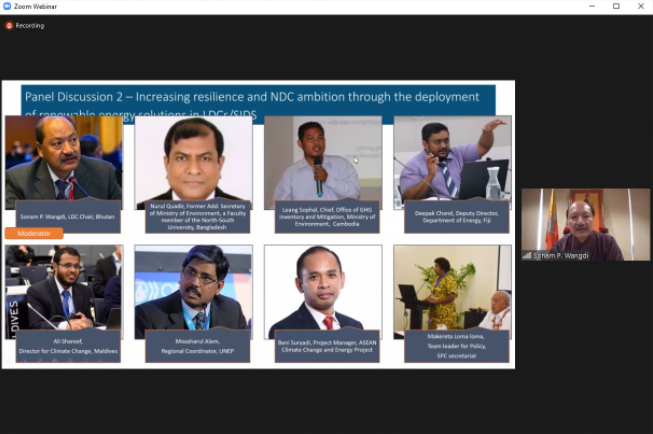
On July 7th 2021, ASEAN Centre for Energy (ACE) was invited to participate in one of the virtual events of the UNFCCC Asia-Pacific Climate Week (APCW) 2021. Organised by the International Renewable Energy Agency (IRENA), the side event discussed the Nationally Determined Contributions in the Asia Pacific Region as the main driver of decarbonisation.
Asia and the Pacific Region comprise a large, diverse and dynamic region globally, with 4.4 billion people living in 58 markets, ranging from the world’s largest energy consumer and the largest oil and gas producers to the small island and low-income economies that are among the most vulnerable to the adverse impacts of climate change.
The region accounts for more than half of global energy consumption, with 85% of that regional consumption coming from fossil fuels. Still, one-tenth of the region’s population lack access to electricity, and a large percentage of the population still relies on traditional biomass use (such as wood combustion) for cooking and heating. In addition, energy demand is rising on account of rapid urbanisation and industrialisation. Notwithstanding, considerable opportunities exist to avoid long-term lock-in with carbon-based energy technologies. The region has significant renewable energy potential with, reducing renewable energy generation costs.
The current round of NDCs offers an opportunity to countries to raise their climate ambitions in new or updated NDCs. These ambitions need to be aligned to sustainable development goals (SDGs) and should incorporate green recovery plans in the background of ongoing global pandemic. This entails every country, city, company, and financial institutions to have a clear road map to net zero by 2050, and have society and economy wide development action plans to ensure inclusive and just transition.
Ambitious climate goals are impossible to meet without climate action through energy transition. The energy transition, however, cannot be considered in isolation of the socio-economic system on which it is deployed. When complemented by supportive policies, energy transition can bring wider benefits in sustainable development goals. Policies to promote a just and fair transformation can maximise the benefits for different communities, countries, and regions.
Beni Suryadi was speaking at Panel discussion 2 – Track 2: Increasing resilience through the deployment of renewable energy solutions in LDCs/SIDS, together with the experts from Bangladesh, Cambodia, Fiji, Maldives, UNEP and SPC Secretariat.

Beni explained that the ASEAN Centre for Energy, as an intergovernmental organisation representing the interest of ten countries in the Southeast Asia region on the energy cooperation, is guided by the regional blueprint on energy cooperation, namely the ASEAN Plan of Action for Energy Cooperation or APAEC. The latest version was endorsed at the 38th ASEAN Ministers on Energy Meeting, November last year, covering 2021 to 2025.
This regional blueprint was set under the theme, “Enhancing Energy Connectivity and Market Integration in ASEAN to Achieve Energy Security, Accessibility, Affordability and Sustainability for All”. A sub-theme was added: “Accelerating Energy Transition and Strengthening Energy Resilience through Greater Innovation and Cooperation.”
Beni explained that ACE plays an active role in accelerating the energy transition in the Southeast Asia region. The APAEC defines energy resilience as the capability of an energy system to withstand and recover from high-impact events and reduce the duration, cost and impact of outages on critical services. Since ASEAN consists of ten countries with various profiles of the energy situation, there is no silver bullet in building energy resilience.
However, looking back to the year 2020, which was a very challenging year for the energy sector in general due to the unexpected disruption from the COVID-19 pandemic. The pandemic was undermining the efforts of ASEAN member states in achieving the regional target of 23% renewables share in total primary energy supply by 2025. However, ASEAN is also started to realise the resiliency of renewables sector compared to other energy sectors. Projects and programs continued amidst pandemic, mainly in solar power, but also in wind and hydro. Highlights such as Vietnam’s continued solar revolution and Myanmar’s solar auction, among others, defined the resiliency of the renewables sector in 2020. Discourses and policy actions of renewables as an integral part of pandemic response and recovery were observed. The year of 2021 is shaping to be another year of uncertainty, but the cautious optimism of energy transition could come from the mixture of renewables promotion and green recovery.
With growing awareness of global energy trends, ASEAN will continue to promote energy resilience through new and emerging renewable energy technologies to support energy security, access, and affordability.
However, inadequate information-sharing and coordination across the climate-energy policy divide impede the energy transition around the world, including in ASEAN. Many energy actors see climate policy as separate and irrelevant for energy policy, while most greenhouse gas emissions come from the energy sector.
To overcome this challenge, ASEAN is implementing the ASEAN Climate Change and Energy Project (ACCEPT). It is the first energy cooperation project between Norway and ASEAN. It aims to support ASEAN in enhancing understanding of the energy-climate nexus and contribute to a more climate-friendly development of the energy sector.
The event has resulted in a fruitful discussion of how NDCs drive the energy transition by outlining emerging technology and innovation strategies in the Asia Pacific Region for mitigation and adaptation measures. Representatives from Governments and International Organisations have provided insights into the work done to achieve their climate action goals. Also, they presented how the benefits of climate action can enhance an inclusive energy transition with multiple climate-resilient agendas to contribute to further sustainable development.
RV AS BS